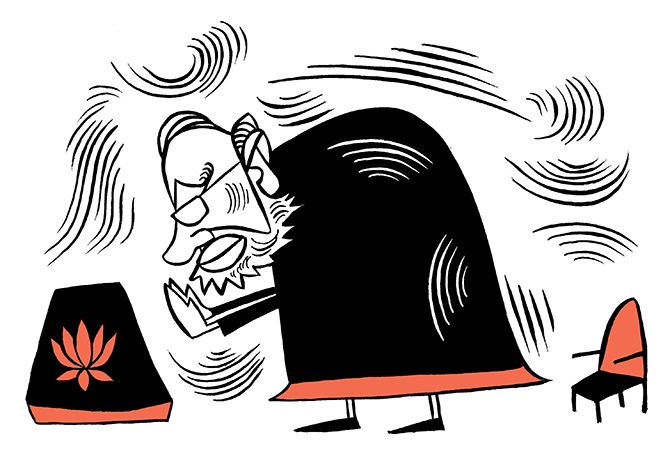'If the 'ideology' is just Hindutva, meaning cattle slaughter, temple issue, love jihad, joined with random acts on the side of economics and foreign policy, then we are in deeper trouble than we think,' says Aakar Patel.
Illustration: Uttam Ghosh/Rediff.com

Does the prime minister have an ideology?
This might be a strange question to ask because his party's Web site advertises its ideology and gives it a name: Hindutva.
But it needs to be asked because one of our most intelligent politicians has said that the party doesn't have a proper ideology.
Former finance minister P Chidambaram was asked a question by a business daily on 'Where he would place the BJP in its philosophical interpretation of the role of the State as a promoter of welfare, provider of health and education for furthering equality or a complete laissez-faire approach?'
This is not a simple question to answer. Laissez-faire is an approach where the government does not participate in the economy and lets private players run everything.
This can roughly be described as a society which people like Ayn Rand wrote about, in which heroic capitalists make the world better through competition, and the incompetent government does not meddle, leaving even health and education to the private sector and letting citizens fend for themselves.
During the 2014 campaign, it was suggested that Modi might be advocating such a system, which was different from the 'socialism' that was favoured by the Congress.
Of course, what has come to be in the last three years is that the 'socialist' schemes like MNREGA etc that Modi promised to shut down he has left intact.
There seems to be no difference between the National Democratic Alliance's approach to the role of the State and the approach of the United Progressive Alliance under Manmohan Singh.
This is what Chidambaram challenged in his reply. He said: 'The BJP does not have a core economic ideology or philosophy. The BJP’s core ideology is only Hindutva and majoritarian government.'
'Any government must have a core economic philosophy that would give an indication of where it stands in the Left-to-Right spectrum. The BJP has, as a party, never reflected on its place in terms of the Left-to-Right spectrum of economic philosophy. Therefore, it is wandering all over the place.'
One can read these as harsh words from an adversary. But though I am not a Congress voter, I think it is important to examine where Chidambaram is going with this.
He said: 'Contrast the Congress's approach, and I would be the first to admit that there were many deficiencies in the implementation of the programmes. But the Congress placed emphasis on three or four issues which defined its core philosophy.'
'First of all, nobody should die of hunger or starvation. That is why we brought the MNREGA and the National Food Security Act.'
The other issues he added as the defining ones are -- pregnant women, lactating mothers, infants and under-five children, interventions in health, including the the immunisation programme and the National Rural Health Mission.
Chidambaram said 'these interventions defined the Congress' core beliefs and philosophy' and added that such specific direction is absent in Modi's outlook.
Pointing to a report that 282 children died in Gorakhpur, he said: 'It is not impacting the central government. It is not impacting the UP government. It is not moving anyone’s heart... To them, lighting up Varanasi on Diwali and building a temple that exemplify their Hindutva philosophy are more important than infant/maternal mortality, malnutrition or hunger.'
The question is not whether the UPA was better at governance than the NDA, Chidambaram is accepting his government's flaws.
The question is: Does the BJP and specifically the prime minister have an ideology and a vision from which their actions are emanating?
Or is Chidambaram correct in saying that there is no coherent narrative that is holding together all the grand initiatives.
Make in India, Swachch Bharat, Demonetisation, Surgical Strike, Bullet Train, Start Up India, GST: Are these all part of something grand and whole?
Or are they individual parts with no meaning attached to them and no linkages with one another?
This is a troubling question that all of us, including BJP voters, need to ask.
The Congress says it tried to focus on certain specific problems. It was unable to convince us, rightly, that it was competent at executing them, even if the intention may have been right. That is behind us now.
It is the turn of the BJP to explain what it is seeking to do and what the grand plan is. Personally, I hope Chidambaram is wrong, and that there is some focussed thinking going on in the NDA on what its five year and ten year achievements should be.
Because if the 'ideology' is just Hindutva, meaning cattle slaughter, temple issue, love jihad, joined with random acts on the side of economics and foreign policy, then we are in deeper trouble than we think.
Aakar Patel is Executive Director, Amnesty International India. The views expressed here are his own.
- You can read Aakar's earlier columns here.











 © 2025
© 2025